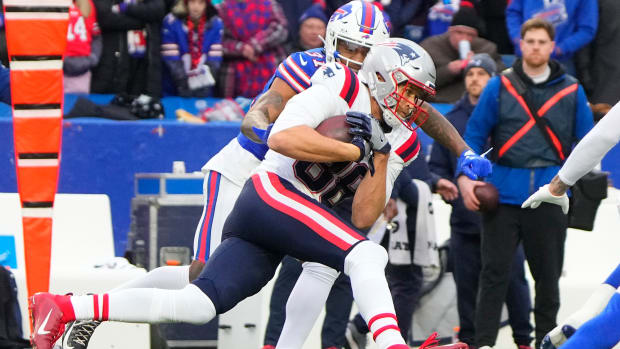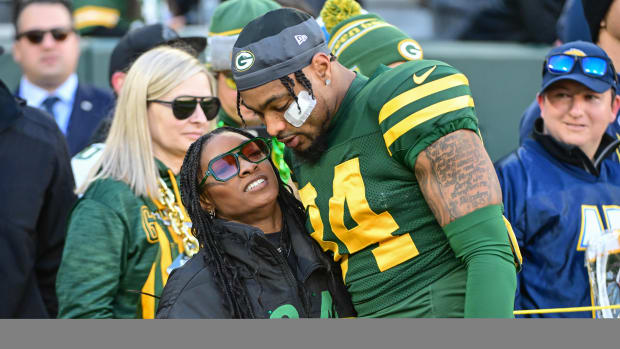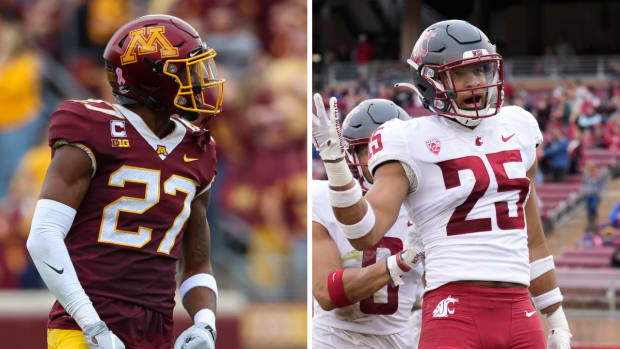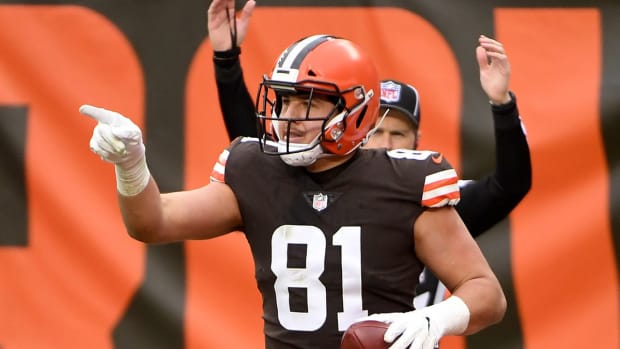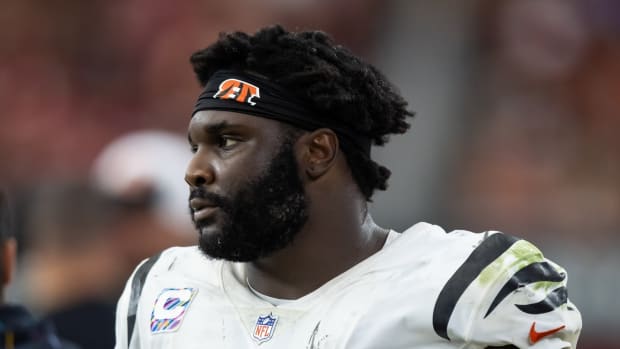Geno Smith Backs Up Pete Carroll’s Decision to Start Him
The best game of Week 3 was one you probably didn’t watch. And maybe if everyone was watching, more people would be drawing conclusions from Seahawks-Lions the way they would if this were the Chiefs and Bills or the Rams and 49ers.
So here’s one for the people who missed this particular showdown in Motown—Geno Smith is pretty good. And I’m not just saying he’s pretty good relative to what you think. He’s a pretty good quarterback, period, and he’s backing up the decision his coach made a month ago to go with him, regardless of who thought it was a head-scratcher at the time.
Pete Carroll’s reward for it Sunday was a quarterback who completed 77% of his passes for 320 yards, two touchdowns, no picks, a 132.6 passer rating and a staggering 10.67 yards per attempt. Oh, and Smith kept the Seahawks swinging in a scintillating 48–45 win over a Lions team that didn’t quit and to keep Seattle within a half game of the NFC West lead.
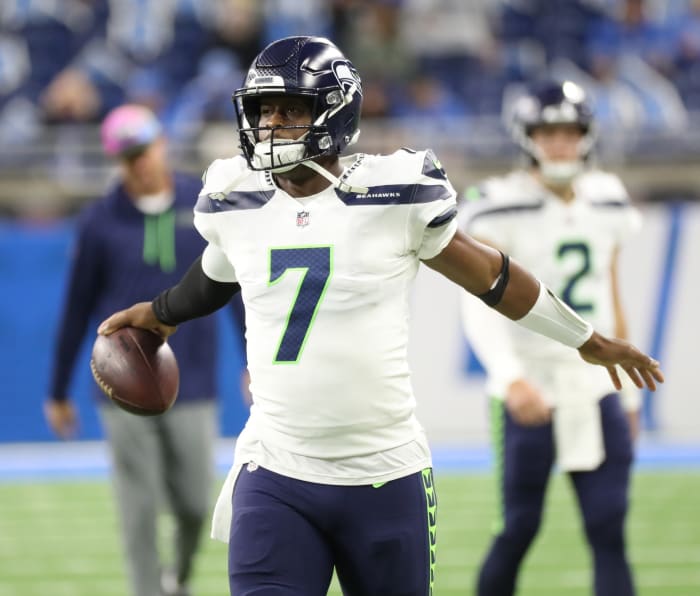
Smith is completing 77.3% of his passes, the highest mark for a QB with a minimum of 125 attempts through four games.
Kirthmon F. Dozier/USA TODAY Sports
And after all, we can also introduce you to the one guy who’s not surprised. That would be, yup, Geno Smith.
“I mean to be honest, I’ve been playing like this for a while,” Smith said from the victorious locker room. “It just doesn’t get recognized by you guys for some reason. But with the offense that I’ve inherited, man, we have playmakers everywhere. And these guys are playing great; they play hard. They’re some of the best players at their position in the league. We drafted two amazing tackles, we signed a first-class center who’s done a heck of a job, our running game is coming along.
“Obviously, we have to continue to build in all areas, but we’re getting better.”
So I asked Smith what we’ve all missed. He mentioned he had a perfect passer rating in his last game for the Jets. He wasn’t lying—he was 20-of-25 for 358 yards and three scores on Dec. 28, 2014, against Miami. He said he’s played well when given the chance since then, and he wasn’t really b.s.’ing there, either. His passer rating in two games, and one start, with the Giants was 84.5; with the Seahawks, over eight games and six starts, it’s 101.8. And how about this: Smith is completing 77.3% of his passes, the highest completion percentage by any quarterback with a minimum of 125 attempts through a team’s first four games of a season, according to ESPN Stats & Information.
That’s why when I asked whether he thinks this sort of play has been sitting there inside of him the past seven-plus years since the Jets jettisoned him in 2015, he didn’t skip a beat.
“It has been,” he said, “for sure.”
It definitely showed up in Detroit, and from the start. Smith was 9-of-10 for 119 yards and a touchdown in the first quarter, 3-of-4 for 51 yards and a score in the second quarter, 6-of-8 for 72 yards in the third quarter, and 5-of-8 for 78 yards in the fourth quarter. And that consistency is why the Seahawks were able to keep answering the Lions.
The Seahawks never punted Sunday; the Lions did just twice. The game’s last seven drives covering the game’s final 26:04: Seahawks missed field goal, Lions touchdown, Seahawks touchdown, Lions touchdown, Seahawks field goal, Lions touchdown, Seahawks touchdown. Jamaal Williams’s 51-yard touchdown run was answered with Rashaad Penny’s 36-yard touchdown run. Jared Goff’s 81-yard catch-and-run connection with T.J. Hockenson was answered with a Smith bomb to Tyler Lockett for 34 yards. And so on.
Goff played really well. Smith was better.
“It was kind of like that last week, where we got into the second half, and we just couldn’t finish drives in the red zone,” Smith said. “We had moved the ball and we just got field goals and couldn’t finish in the red zone. So coming into this week, a big emphasis of it was just really starting fast and then finishing strong and finishing with touchdowns in the red zone. And obviously the game was back-and-forth, and we had to continue to score. But no matter what, that was our mentality coming in, that we’ve got to finish better in the second half.”
Smith added that it reminded him of his first game in the Big 12, almost a decade ago exactly, after West Virginia moved over from the Big East—it was Sept. 29, 2012, when the Mountaineers beat Baylor, 70–63, and the then senior quarterback threw for 656 yards and eight touchdowns. And he said that, yes, that kind of game is “extremely fun.”
And what was the most fun about Sunday’s game? “The best part is that we got to see some run checks, and we were able to catch them in zero,” Smith said, citing the Penny 36-yarder as one where he changed the call at the line to take advantage of the Lions’ blitz call. It was rewarding, he continued, because of the work he and his teammates did to be able to communicate in a hostile environment, and silence the crowd with a big play.
Of course, there was no shortage of big plays on a day in which 1,075 yards from scrimmage were compiled between the two teams.
That said, for Smith, and the Seahawks, the best yards were the toughest ones to get—right at the end of the game, when Penny got the ball on three consecutive snaps, when Detroit knew it was coming, and Penny picked up 12 yards to sap the Lions of their three timeouts and set up two Smith kneel-downs to put the win away.
“That’s our standard, man. That’s our standard,” Smith said. “That’s the type of football we want to play. You talk about four-minute offense, and they know we’re going to run the ball. And everybody in the stadium knows the ball is going to get run, but we have to be able to be tough enough and sound enough and block well enough and run well enough to pick up those first downs that end the game and not put our defense back on the field; that’s our standard.”
The Seahawks lived up to it Sunday with a 31-year-old quarterback who’s been a kind of quiet revelation early this year for those paying attention.
Of course, a good month is just a good month. And that goes for a whole team that also might be a little better than everyone thinks.
“I think as the season continues, it’s up to us to prove that,” Smith said. “I can’t say that right now. We’re 2–2. I felt like we could’ve won the last game, too, but if we feel like we’re better than people realize, it’s on us to go out there and prove it on Sundays. That’s really it. Nothing else matters; nothing we say matters. It’s about how we execute when it’s game time.”
Smith has proven at least a little something thus far. The Seahawks have, too.

Lutz made one field goal from 60 yards but missed a 61-yarder when his kick bounced off the upright and then the crossbar, giving the Vikings a 28-25 victory over the Saints.
Peter van den Berg/USA TODAY Sports
Vikings 28, Saints 25 will be remembered most for that double-doink, no question. And how close kicker Wil Lutz came to having a pair of 60-yarders in the same game to force overtime—his 60-yarder with 1:51 left tied the game at 25.
I saw someone call what happened with Lutz’s game-tying field-goal attempt, at the end of Sunday’s game between the Vikings and Saints in London, as Plinko. And I thought, for most kids who watched The Price Is Right on sick days in the 1980s and ’90s, that was the perfect way to describe a 61-yarder that bounced off the upright (clearly having the distance) and then the crossbar, then harmlessly falling to the turf in front of the goalposts.
“Obviously, he hit it pretty pure after making one from 60 before that,” Vikings coach Kevin O’Connell said. “So when he hit that one, in my mind, we were getting ready to go to overtime, and that’s what it was going to be. And obviously when it bounced the first time, we said O.K. And then when it hit the ... I think it hit the upright and didn’t go in, I just think it was just kind of how the day went. We can be a lot better and try not to let it come down to that. But I’m proud of our team, Albert.”
He should be because that game really did become a battle of wills.
Both Andy Dalton, in for Jameis Winston, and Kirk Cousins played well. The defenses had their moments, too. But the Vikings’ ability to escape London with a win came down to, really, two people.
The first one is pretty obvious—and that’s Justin Jefferson, who finished with 10 catches for 147 yards while spending a good chunk of the day matched up on Saints All-Pro cornerback Marshon Lattimore. Jefferson’s biggest play, without question, ended up being his final one, singled up in man coverage against Lattimore on a first-and-10 from the Vikings’ 32 with 1:38 left. With the call, O’Connell guessed that a 14-yard run by Dalvin Cook on the previous play would generate another man look he could exploit with his best player.
Sure enough, there it was.
“I thought there would be a good chance, at least, we would get a chance to get some single coverage there and wanted to give Justin a chance to just run vertical and run by Lattimore,” he said. “It’d been real competitive the whole game, obviously, and he had a great release. And then, a couple times now when we had to have it, [Cousins] made a great throw and put it in a place where Justin could go get it.”
And Jefferson did go get it—picking up 39 yards to put Minnesota comfortably in field goal range, which brings us to the other important figure here.
That’d be kicker Greg Joseph. Minutes before Jefferson’s big play, and after a Jefferson touchdown (on an end-around), Joseph hooked an extra point. It kept the score at 25–22 and allowed for Lutz’s first 60-yarder to tie the game with 1:51 left.
Joseph was 4-for-4 on field goals before that, and after reaching the sideline after his missed PAT, O’Connell pulled him aside and said, “Greg, you’re gonna make the game-winner one way or another.”
Jefferson’s catch, of course, set him up to do just that. Three run plays later, and Joseph was drilling a 47-yarder right down Main Street to give the Vikings the lead. From there, Minnesota’s defense had to endure a late rally by Dalton and the Saints—a 32-yard catch from fantastic rookie Chris Olave sparked it—and then the double-doink.
With all that in the rearview, Minnesota is 3–1 and tied with the Packers, who they handled on opening day, with a ton of room left to grow after getting what they feel like was the most out of the trip to London.
“I’m proud of our team and the way they’ve handled it. We had a pretty clear-cut plan of how we wanted to come about this,” O’Connell said. “A lot of people questioned us coming [to London] later, but we played our best football in the end, and I had a great experience over here, and the NFL and our team and all the guys that I relied on to help me make the decisions we did when we did, how we came out here, how we traveled, our team handled it really well. And now we have to go get ready to play a home game next Sunday at U.S. Bank.”
And one that, all of a sudden, has got some real meaning to it, with the Bears up next.

Ekeler's touchdown late in the fourth quarter sealed the win for the Chargers over the Texans.
Kevin Jairaj/USA TODAY Sports
If there was a team that could be excused for hanging its head Sunday, it’d have to be the snakebitten Chargers. After taking an AFC West split through two weeks, Week 3 was an outright disaster for Brandon Staley’s group. They got blown out at home, 38–10, by the Jaguars, and lost burgeoning star left tackle Rashawn Slater and Pro Bowl edge rusher Joey Bosa, in the process.
What’s worse is this is a team that always seems to have this kind of injury luck. And yet …
“You don’t really have time to feel bad for yourself,” tailback Austin Ekeler told me late Sunday afternoon. “You feel bad for those guys, absolutely. But as a team, we gotta go out there and play. So whoever’s stepping up, let’s go. Because it doesn’t matter; there’s the entire nation that doesn’t care who’s hurt. All they care about is what the score is.”
It took a little longer to make sure of it than the Chargers hoped—but they did wind up on the right side of it Sunday, and that’s a real step, even if this one was over the rebuilding Texans.
And it was a real step for the Chargers in part because there was a gut check involved.
Now, to be clear, no one would be complaining if L.A. had just kept running away from Houston, which it seemed to be doing in the first half in building a 21–0 lead, then going into the half up 27–7. That, of course, didn’t happen, and so the Chargers got a nice snapshot of their collective backbone instead.
First, the Texans marched 87 yards in just eight plays behind quarterback Davis Mills to cut the deficit to 27–14. Then came a five-play, 93-yard drive, keyed by Mills hitting Brandin Cooks for 58 yards, to get Houston to within a possession. After that, Chargers return man DeAndre Carter fumbled the kickoff to give the Texans possession, down six with 9:58 to go, and L.A. looking like a much different team than the one that took the field in the first half.
“It was just little things here and there,” Ekeler said. “For example, coming out of halftime, I didn’t set up a screen as well as I should’ve, which should’ve been a gash down the sideline. It was like four of us on two of them, and so that puts us into a third down, and then Gerald [Everett] comes out and drops it on third down. It’s little things like that where it’s like, We can’t do it. We can’t afford to have that happen. Because then, we went three-and-out, and now the defense is back [out there], and now they went and scored.”
And so, after the Texans pinned the Chargers back at their own 16 with the score 27–24, the offense knew what was at stake.
“We knew, we felt the pressure,” Ekeler said. “We feel the emotional ups and downs of the game and we feel like, O.K., hey, they’re driving, we’ve been getting stopped. We need to go and score points. That’s what the feeling is for us every time we’re on the sideline. We try to keep it as consistent as we can. And so the messaging is the same. Guys are ready to get on the field, guys are ready to go make plays.”
The Chargers did, and in the most critical spots—converting a third-and-2, fourth-and-2 and third-and-6 to get in the red zone. From there? A penalty moved the ball from the 19 to the 14, Ekeler was stacked up for no gain on first down, and that only helped to set up the coaches to take advantage of a tweak in how the Texans were defending the Chargers’ run game.
“During the second half, they were really crashing down on our wide zones, playing really hard downhill, and so it set it up perfectly for our little naked [bootleg] play with me out in the flat,” Ekeler said. “It’s a play-action, me selling wide-zone then obviously not getting the ball and going out to the flat. We ended up setting it up perfectly just throughout the game, so shout out to Joe [Lombardi] for calling plays that were going to be effective down there in the red zone and get us in. There was no one on the edge, so it was a race to the end zone.”
Ekeler put the Texans away with the touchdown, even if he might have, at least slightly, embarrassed himself along the way in diving at the pylon to put the Chargers up 34–24.
“Justin was telling me it was a bad reach, because I dove, I reached for the pylon and I could’ve just ran it in,” he said. “I don’t know; I put some flash on it for whatever reason.”
Either way, it worked. It worked with veteran Kyle Van Noy in Bosa’s spot and rookie Jamaree Salyer in Slater’s spot. And the hope now is that it’ll keep working so the Chargers remain where they should be, in contention, when at least one, and maybe both Slater and Bosa are ready to return later in the season.
At the very least, the Chargers seem to be approaching all this the right way.
“We leaned on each other,” Ekeler said. “We depended on ourselves. We go out to practice every day, we go out in these games and we battle the opponent. We go through war together, basically. And when we got down, like I said, nobody wavered. We looked at each other, we leaned on ourselves, we brought our own energy, coaches did a good job calling the game, keeping us level-headed, correcting our mistakes. We just went out there and we finished off playing dominant football.”
And they believe they’re capable of a lot more of it.
More NFL coverage:
• NFL Week 4 Takeaways: Inside the NFLPA Investigation and Concussion Protocol
• Pickett in Good Hands With Mike Tomlin
• Next Man Up: Top Coaching Candidates for 2023
• We Need Answers About Tua Tagovailoa’s Injuries
• Ryan Griffin’s Long Life As Tom Brady’s Backups’ Backup



































